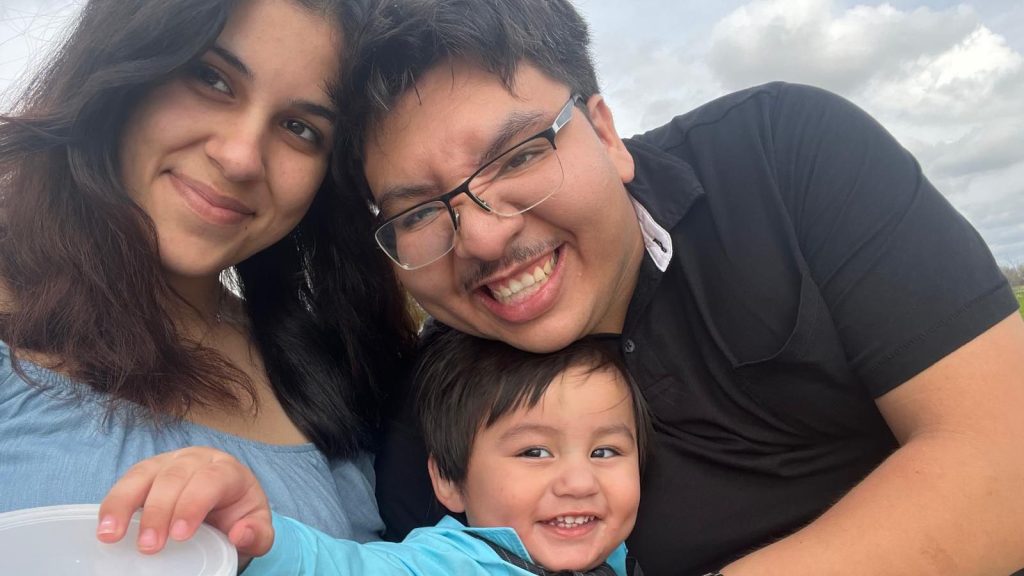Economic Concerns Drive Young Voter Engagement in the Upcoming U.S. Election
4 min read
Isabella Morris says it's tough to make ends meet as a young family

Isabella Morris says it's tough to make ends meet as a young family
As the U.S. presidential election approaches, one demographic is capturing the attention of both political parties: young voters. With economic challenges such as inflation and housing affordability at the forefront, these issues are likely to motivate this crucial voting bloc to head to the polls.
For 21-year-old Isabella Morris from Rosenberg, Texas, this election marks her first time voting for president. Recently married and a mother of a two-year-old, Isabella works part-time while her husband manages a full-time job. The family rents a small one-bedroom apartment, and their financial situation has become increasingly precarious.
Isabella explains, “We can’t afford any mistakes. We have no savings. One job used to be enough to live on, but now we’re barely scraping by.” Her worries about economic stability will influence her voting decision in November, although she remains undecided about which candidate to support. “Candidates must address the economic crisis right now,” she emphasizes.
Isabella is among the 8 million young people voting for the first time, and voters under 35 now make up about a third of the U.S. electorate. Polls indicate that economic issues are their top priority this election cycle. A Gen Forward Survey from the University of Chicago reveals that, while topics like reproductive rights and gun violence have garnered headlines, young voters aged 18 to 26 prioritize economic growth, income inequality, and poverty as their primary concerns.
This shift in focus marks a notable change from the 2020 election, when the pandemic and issues of racial justice were more pressing for young voters.
Escalating Economic Challenges
Isabella’s concerns reflect the broader struggles faced by her generation, who are grappling with high rents, unaffordable housing, and stagnant job creation. TikTok economist Kyla Scanlon, 27, points out that young people today face worse financial conditions than millennials did following the 2008 financial crisis. “There’s no beginner mode anymore; the bottom rung of the ladder just feels completely gone,” she remarks.
Data from credit agency TransUnion shows that individuals aged 22-24 now carry more debt—across credit cards, car loans, and mortgages—than their millennial counterparts did at the same age. As their debt continues to rise faster than their income, these economic fears may drive many young voters to the ballot box.
Abby Kiesa, deputy director of the Center for Information and Research on Civic Learning and Engagement (Circle), predicts that about half of young voters will participate in this election, mirroring the turnout seen in 2020, which was the highest in decades. Although turnout among young voters still lags behind older demographics, mobilizing this group could be pivotal in a closely contested election.
Kiesa stresses that candidates need to engage with young voters by addressing their economic hardships: “For the past three elections, turnout among young voters has been historic. We need candidates who understand and speak to their needs.”
Candidates Focus on Economic Issues
Both presidential nominees, Vice President Kamala Harris and former President Donald Trump, have sharpened their economic messaging to attract young voters. Harris has built on the Biden administration’s initiatives, proposing a $25,000 subsidy for first-time home buyers and a $6,000 tax credit for families with newborns. Her campaign has ramped up youth outreach, enjoying endorsements from celebrities and leveraging social media to connect with younger audiences.
Trump, on the other hand, aims to capitalize on economic discontent by attacking the Biden administration’s record and promoting his previous administration’s achievements. He has pledged to eliminate tip taxation and reduce regulatory barriers for cryptocurrency, both appealing to younger voters working in service industries.
Recent polls indicate that while Trump initially made inroads with young voters during his last campaign, Harris has regained a significant lead, holding a 31-point advantage among likely voters aged 18-29.
Empowering Young Candidates
Economic struggles are not just motivating young voters; they are also inspiring some to run for office. Gabriel Sanchez, 27, a Democratic candidate in Georgia, hopes to alleviate financial pressures on his generation. A waiter who has faced constant rent hikes, Sanchez believes that housing and healthcare should not be privileges for the few.
Similarly, 21-year-old Wyatt Gable, a Republican candidate in North Carolina, is poised to become the youngest person elected to his state legislature if he wins in November. He emphasizes that the current economic landscape—marked by inflation and high interest rates—will weigh heavily on the minds of young voters this election season.
As young voters mobilize around economic issues, their engagement in the political process could shape the future of American politics. Whether through voting or running for office, this generation is determined to make their voices heard.